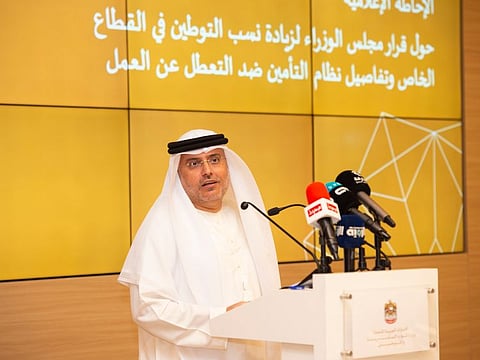Companies in UAE supporting employment of Emiratis will be rewarded
The step aims at creating more than 12,000 jobs annually for Emiratis

Dubai: Companies in the UAE supporting the employment of Emiratis will be rewarded as part of a new drive aimed at boosting the Emirati workforce in the private sector. Abdulrahman Al Awar, Minister of Human Resources and Emiratisation, announced this today, saying that the new Cabinet resolution will enhance the participation of Emirati talents in the private sector.
“The resolutions come within NAFIS, the federal programme that aims to increase the competitiveness of the Emirati workforce and facilitate the private sector employment of UAE citizens,” Al Awar said during a media briefing at the ministry’s headquarters in Dubai.
The incentives include reducing the service fees of the Ministry of Human Resources and Emiratisation by 80 per cent for private sector establishments that accomplish major achievements in terms of recruitment and training of Emirati citizens.
“The Cabinet approved increasing the Emiratisation rate to 2 per cent annually for high-skilled jobs in establishments that employ 50 workers or more. The plan aims to ensure 10 per cent Emirati workers in the private sector workforce in the next five years,” he added. The step aims at creating more than 12,000 jobs annually for Emiratis across all sectors of the economy.
The move was part of a series of decisions announced during a Cabinet meeting earlier this week, chaired by His Highness Sheikh Mohammed bin Rashid Al Maktoum, Vice-President and Prime Minister of the UAE and Ruler of Dubai.
Meanwhile, noncompliant companies will have to pay Dh6,000 monthly, starting from January 2023, for every Emirati position that has not been filled. “The noncompliant companies will pay Dh7,000 for the second year for every citizen and Dh8,000 for the third year and so on until a maximum of Dh10,000,” Al Awar added. He expected that companies in the private sector will commit to the new resolutions and will increase Emiratisation by 2 per cent for highly-skilled jobs, until they achieve the 10 per cent target by 2026.
“It is like one Emirati for every 50 employees in a company. Every year, the ministry issues 1.2 million work permits in the UAE,” said Al Awar. According to him, more than 31,000 Emiratis are working in the private sector. “Highly-skilled jobs for Emiratis means employees who have an academic qualification from high school degree onwards. About 97 per cent of Emiratis employees are currently working in high-skilled jobs,” he said.
What is NAFIS programme?
NAFIS offers various benefits, including the Emirati Salary Support Scheme, whereby UAE citizens are offered one year’s salary support, up to a maximum of Dh8,000 per month, during training, and a monthly support of up to Dh5,000 for up to five years for university graduates. The programme provides UAE citizens specialised in fields such as coding, nursing and accounting with a top-up on their existing salaries. The programme also offers a subsidised five-year government-paid contribution on the company’s behalf against the cost of pension for Emirati staff and full support for an Emirati’s contribution across the first five years of his or her employment.
NAFIS also offers Private Sector Child Allowance Scheme. The scheme is a monthly grant to Emirati staff working in the private sector for up to Dh800 per child, up to a maximum of Dh3,200 per month.
Data discussed during the meeting revealed that the total number of new Emiratis who joined the private sector since the launch of NAFIS in September 2021 and till March 2022 reached 5,558, while the number of companies that hired new employees increased to 1,774.
It was also revealed that the number of Emiratis registered on the platform and eligible for benefits under the NAFIS initiative reached 25,876. The number of job opportunities on the platform reached 2,524, while the number of beneficiaries increased to 4,074 people.
Sign up for the Daily Briefing
Get the latest news and updates straight to your inbox



